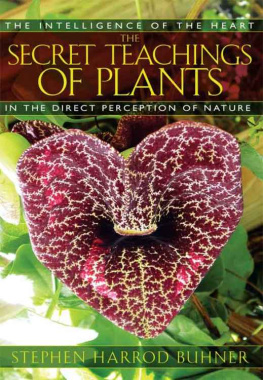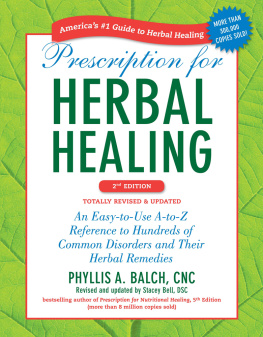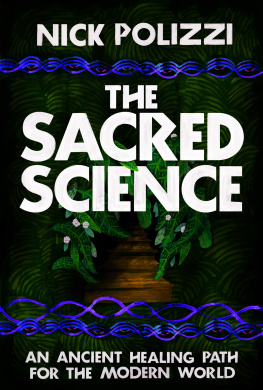PRAISE FOR OTHER BOOKS BY STEPHEN HARROD BUHNER
Sacred Plant Medicine: Explorations in the Practice of Indigenous Herbalism
[Sacred Plant Medicine] offers the doorway into the heart of the green world that so many people have been waiting for.
Rosemary Gladstar, author and herbalist
This is a fascinating book on the sacred use of plants that heal. It is useful as a reference book and inspires the reader to look again at the plant world as a source of life and healing.
Joan Halifax, author of Shamanic Voices and The Fruitful Darkness
Sacred Plant Medicine beautifully makes it clear that one does not have to be of a certain color or ethnic background to seek and find a way of being in harmony with the North American land
Brooke Medicine Eagle, author of Buffalo Woman Comes Singing
This is the first in-depth analysis of the processes used by Native Americans to communicate with the plant world for the purposes of healing human illness. It is a work long overdue
William S. Lyon, co-author of Black Elk: The Sacred Ways of a Lakota
One Spirit Many Peoples: A Manifesto for Earth Spirituality
This may be the best book yet by a non-Indian [on] the contemporary issues facing Native American religious practice and the non-native spiritual seeker.
Joseph Bruchac, Native American author
As an outspoken advocate of restoring an indigenous mind for all people who love the earth, Buhner has gathered an impressive array of arguments to support his position.
NAPRA Review

A dog is used to pull the still sleeping mandrake from the earth. (Illustration from Tacuinum sanitatis, in Medicina sanitatis. Codex Vindobonensis.)
SACRED
and HERBAL HEALING BEERS
The Secrets of Ancient Fermentation
STEPHEN HARROD BUHNER

Siris Books, an imprint of Brewers Publications
A Division of the Brewers Association
PO Box 1679, Boulder, CO 80306-1679
(303) 447-0816; Fax (303) 447-2825
www.BrewersAssociation.org
1998 by Stephen Harrod Buhner
All rights reserved. Except for use in a review, no portion of this book may be reproduced in any form without written permission of the publisher. Neither the author, editors, nor the publisher assumes any responsibility for the use or misuse of information contained in this book.
Printed in the United States of America
10 9 8
ISBN-13: 978-0-937381-66-3
ISBN-10: 0-937381-66-7
ISBN (epub edition): 978-1-938469-09-1
Siris Books. Who is Siris? She was the daughter of Ninkasi, the Sumerian goddess of beer. Anthropologists personify Siris as the beer itself.
Please direct all inquiries to the above address.
Disclaimer. Many of the formulas (recipes) for beers (fermented beverages) in this book were commonly consumed in historic times, and traditionally included the use of poisonous plants. In such cases the recipes and instructions for these beers are for historical and educational purposes only. The Publisher and the Author do not recommend the making or use of these beers by the reader. The Author and Publisher shall be held blameless for any injury to the reader that may occur from the ingestion of any of these beers.
Library of Congress Cataloging-in-Publication Data
Buhner, Stephen Harrod.
Sacred and herbal healing beers: the secrets of ancient fermentation / Stephen H. Buhner.
p. cm.
Includes bibliographical references and index.
ISBN 0-937381-66-7 (alk. paper)
1. Beer. 2. Brewing. I. Title.
TP577.B84 1998 | 98-17064 |
641.23dc21 | CIP |
It is impossible to dedicate
a book to Nobody.
This one then is for Maria.
CONTENTS
SACRED PLANTS AND TREES USED IN RECIPES FOR BEERS, ALES, AND MEADS
Agave
Avens
Banana
Barley
Betony
Birch
Borage
Bracken fern
Broom
Buckbean (or bogbean)
Burnet
Calendula
Caraway
Cardamom seed
Carrot seed, wild
Chamomile
China root
Clary sage
Coriander
Corn
Cornstalk
Costmary
Cow parsnip
Cowslip
Dandelion
Darnel
Dock
Elderberry
Elderflower
Elecampane
Eyebright
Fir
Gentian
Ginger
Grains of paradise
Ground ivy
Heather
Henbane
Honey
Hop
Horehound
Hyssop
Irish moss
Juniper
Lemon balm
Lettuce, wild
Licorice
Mandrake
Manioc
Maple
Meadowsweet
Millet
Mint
Molasses
Mugwort
Myrica
Nettle
Oak bark
Palm
Pennyroyal
Peppermint
Pine
Rice
Rosemary
Rue
Saffron
Sage
Saguaro
Sarsaparilla, wild
Sassafras
Scurvy grass
Serviceberry
Spruce
St.-Johns-wort
Sweet flag
Tansy
Wintergreen
Wormwood
Yarrow
(See the index for page numbers.)
ACKNOWLEDGMENTS
This book would not have been possible without: my editor, Toni Knapp, who bugged me for a year to write it (all the blame goes to her); Alan Eames, who opened his extensive library for my research, his home to my presence, and his phenomenal knowledge of beer and brewing to my endless questions; Dale Pendell, whose remarkable Pharmako/poeia helped me to find the heart of this book; and Mikal Aasved, his tremendous 1,380-page doctoral dissertation Alcohol, Drinking, and Intoxication in Preindustrial Society: Theoretical, Nutritional, and Religious Considerations, his insight, depth of respect, encyclopedic research, and willingness to challenge Western beliefs about what alcohol is and is not. Thanks to all.
The Lord hath created medicines out of the earth,
and he that is wise will not abhorre them.
ECCLES. 38.4
As they fell from heaven, the plants said, Whichever living soul we pervade,
that man will suffer no harm.
RIG-VEDA
Rise up, become abundant with thine own greatness, O barley.
ATHARVA VEDA
From mans sweat and Gods love, beer came into the world.
ARNOLDUS
AUTHORS NOTE ON THE TEXT
I have structured this book, perhaps, in an odd manner. Information on how to make beers is in here, but this is not a simple manual. Probably the closest thing to a step-by-step instruction to making beer is contained in appendix one. This book is primarily intended to share the poetry and beauty of ancient fermentation and only secondarily to share recipes, some more than 2,000 years old, for making ancient sacred and healing beers. Any recipe in this book that calls for malted barley can be altered by the use of canned (unhopped) malt extract or a combination of brown sugar and molasses (see appendix one for the details). And since so many people keep asking: No, I havent made all these beers, but I have made more than one.
PROLOGUE
The ancient legends tell how the goddess took pity on the miserable plight of humanity and so loved her daughters that she bestowed the gift of beer to their sole keeping. It is almost a universal human belief that beer did come into the world so that the sons and daughters of men might celebrate possessed by the spirit of the earth mother and forget the sorrows of death with the barley cup of forgetfulness that gladdens hearts in song and rejoicing
Next page








